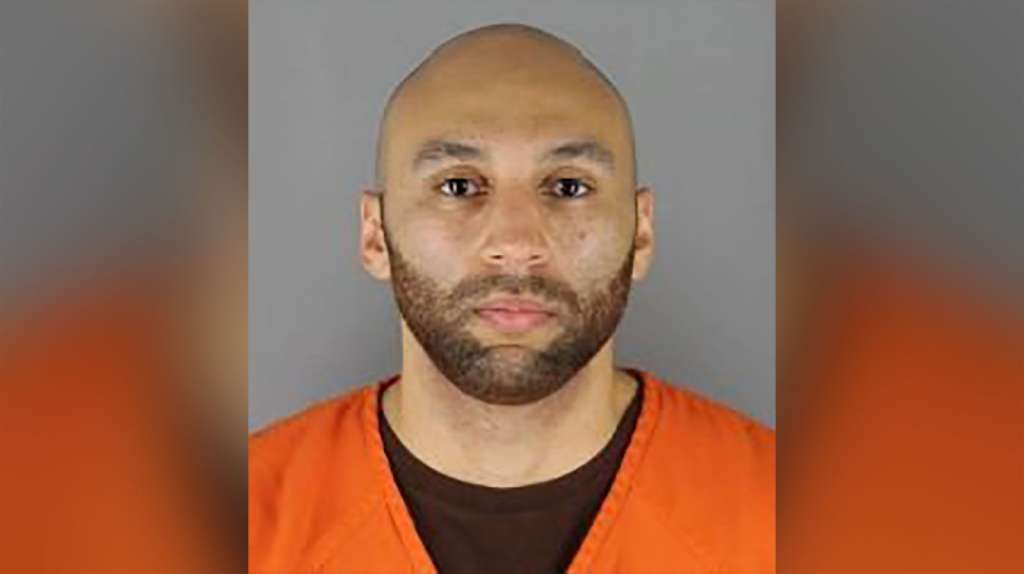ST. PAUL, Minn. (AP) — A former Minneapolis police officer convicted of violating George Floyd’s civil rights was sentenced in federal court Wednesday to three years in prison, with a judge citing J. Alexander Kueng’s rookie status in handing down a punishment lighter than called for in guidelines.
U.S. District Judge Paul Magnuson went below a range of 4¼ to 5¼ years called for in complex formulas that help determine sentences, and despite prosecutors arguing that Kueng “didn’t say a word” to stop Officer Derek Chauvin from killing Floyd as Chauvin knelt on Floyd’s neck for 9 1/2 minutes.
Kueng held Floyd’s back, Officer Thomas Lane held his feet and Officer Tou Thao kept back bystanders, some of whom recorded video that led to worldwide protests and a reckoning on racial injustice.
Magnuson called Floyd’s death “a serious offense” and said there was no question that Kueng violated his rights by failing to get off him when Floyd became unresponsive during the May 25, 2020, arrest. But he also held up what he called “an incredible number” of letters supporting Kueng that he said came from other police officers.
“You were truly a rookie officer,” Magnuson told Kueng.
The federal government brought the civil rights charges against all four officers in May 2021, a month after Chauvin was convicted of murder and manslaughter in state court. They were seen as an affirmation of the Justice Department’s priorities to address racial inequities in policing, a promise made by President Joe Biden before his election. And they came just a week after federal prosecutors brought hate crimes charges in the killing of 25-year-old Ahmaud Arbery in Georgia and announced two sweeping probes into policing in two states.
Kueng and Thao were convicted in February of two counts of violating Floyd’s civil rights. The jury found they deprived the 46-year-old Black man of medical care and failed to stop Chauvin. Kueng, who is Black, was sentenced to three years on each count, to be served concurrently. Thao, who is Hmong American, was due to be sentenced later Wednesday.
Kueng’s attorney, Tom Plunkett, had sought a two-year sentence, according to prosecutors.
Prosecutor Manda Sertich rejected an argument that Kueng deserved leniency because of his inexperience.
“All he had to do, per MPD (Minneapolis Police Department) policy, was attempt to intervene … but he didn’t say a word. Not one word,” Sertich said. “Defendant Kueng’s argument about his junior status doesn’t hold much weight because the bar for him was so low, and he didn’t even try to get over it.”
The lower sentence for Kueng raises questions about whether he would consider a plea deal or risk a state court trial on Oct. 24, when he and Thao face counts of aiding and abetting second-degree murder and second-degree manslaughter.
Chauvin, who pleaded guilty last year to violating Floyd’s civil rights and the civil rights of a teenager in an unrelated case, was sentenced to 21 years in federal prison. Lane, who twice asked if Floyd should be rolled onto his side so he could breathe, was convicted of one count and was sentenced last week to 2 1/2 — a sentence Floyd’s brother Philonise called “insulting.”
Kueng and Thao got a victory last week when Magnuson issued rulings that affected how their federal sentences would be calculated. The rulings — particularly one that cross-references their crimes with involuntary manslaughter instead of murder — meant the men headed into Wednesday’s hearings with a recommended range of 4 1/4 years to 5 1/4 years. They might have faced a life sentence.
Mark Osler, a professor at the University of St. Thomas School of Law and former federal prosecutor, said ahead of the hearings that Kueng and Thao would likely seek a plea deal on the state charges that won’t exceed the federal sentence and will let them serve the sentences concurrently.
Kueng and Thao can still appeal their federal convictions. If they plead guilty in state court, any federal appeal would be moot, said Mike Brandt, a criminal defense attorney who has been following the case. But it’s also hard to win a federal appeal, he said.
“Those are some of the calculuses they are going to have to make in terms of, `Do I go to trial and risk something worse? Do I think I have a good shot at appeal on the federal case?'” Brandt said.
Lane, who is white, pleaded guilty to a state charge of aiding and abetting second-degree manslaughter and is awaiting sentencing in that case. He was allowed to remain free on bond after his federal sentencing.
Chauvin, who is white, was sentenced to a 22 1/2-year state sentence in addition to his federal sentence. Those sentences are being served simultaneously.
(Copyright (c) 2024 The Associated Press. All Rights Reserved. This material may not be published, broadcast, rewritten, or redistributed.)

